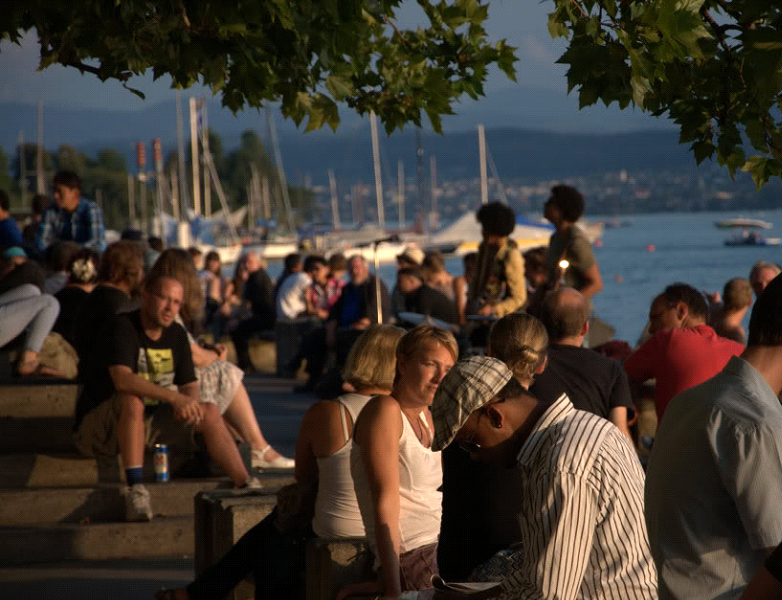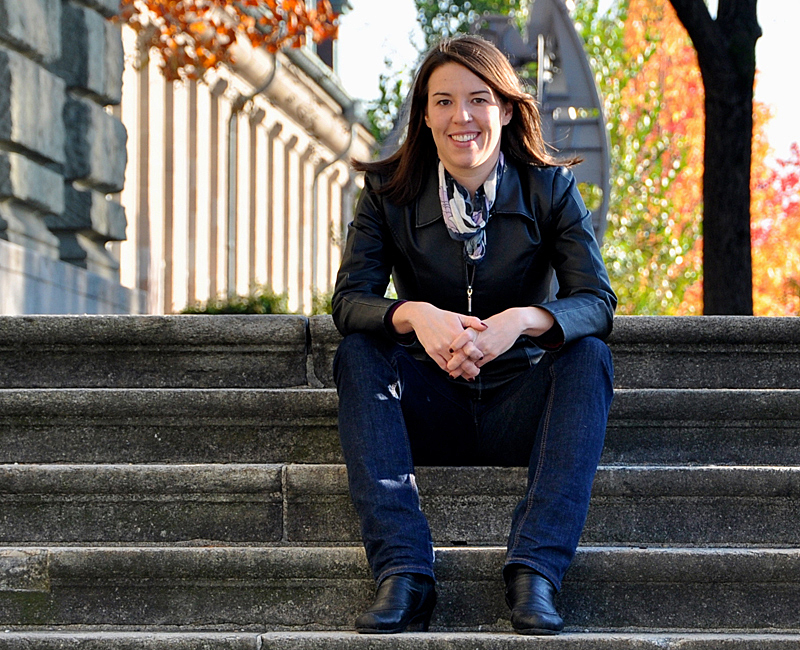First steps in «Schwiizerdüütsch»
Heather Kirk has left her Canadian homeland for a research stay at ETH Zurich. As a globetrotter, she describes her life in Zurich and what particularly impressed her about Switzerland and the Swiss.

I’d passed through Zürich twice before, once on holiday in my early twenties, and a second time while doing an internship in Delémont, Switzerland in 2004. But for some reason the city didn’t make a big impression during those visits, perhaps because there aren’t many well-known central landmarks compared to some other European cities. So when I was hired as a post-doc at ETH starting in July, I wasn’t sure what to expect. I met a couple of Swiss people in Canada before I departed for the land of the Alps and holey cheese, and I was warned about the high cost of living, as well as the difficulties for ‘outsiders’ to make Swiss friends. So with a tiny bit of trepidation but a great sense of adventure, I set out for my new hometown at the end of June.
First Impressions
I arrived at the best possible time of year – the last couple of days in June were sweltering hot, and the locals and expats alike were spending their lunch breaks, evenings, and weekends promenading along the lakeside, chatting at outdoor cafés, and enjoying the city’s many fantastic swimming spots. Everybody was cheerful, and there was an array of cultural and music festivals, art galleries and exhibitions, and of course interesting bars and restaurants to explore. I had the good luck to meet a great group of Swiss women through my roommate shortly after I arrived, and was immediately and warmly accepted into the tribe with open arms. Also, the many events organized via the large expat community in Zürich made it easy to get out and connect with an assortment of foreigners from various countries, who shared common interests. And of course the opportunities to escape into the mountains for a short ridge walk or an intense alpine hike were irresistible.
Moving through the first two months of my stay, I was continuously struck by a sense of surrealism – even though I was working intensely during the day, immersing myself in my new research project at the Institute of Agricultural Sciences (ETH), I spent my evenings and weekends absorbed in sports, culture, and social events as never before. I had the feeling that my summer holiday was ongoing, and the pace of life among the Swiss suited me to a ‘T’; the locals work hard during the day, but engage in sports, outdoor activities, and other hobbies with passion and energy. Somehow I felt like I had come home.
Swiss Integration
I’ve been in Zürich for four months now, and while the holiday feeling has subsided, and winter is approaching, I continue to gain an appreciation for living in the city, which is often ranked as one of the world’s most ‘liveable’ cities. Of course it’s a bit boring to mention the ease of public transportation here, but it IS a huge advantage to be able to travel to most parts of the city or the outskirts in less than half an hour. And while Zürich offers most of the benefits of a large city, it still feels rather like a small community: even after the trams stop running at night it’s still possible to walk between many key spots, and I’m constantly running into acquaintances on the street, even though my social network it still relatively small.
I’ve been trying to learn some Swiss German, which many foreigners regard as a difficult and unpleasant language. However after living in the Netherlands for several years where I learned Dutch, I find the linguistic sounds quite familiar, and the language has a very pleasing melody and cadence to my ears. I’ve found a language exchange partner via the ETH whiteboard, and have spent a few pleasant evenings learning ‘es bitzeli Swiitzerdütch’ (a little bit of Swiss German). I know the grammar is poorly defined, and most expats warn that learning Swiss German is futile, but I find that understanding a bit of the language gives me a greater sense of cultural understanding, and makes it a bit easier to socialize with my Swiss friends, who have a special place in their hearts for their language.
Speaking of friendships: Though it may be hard to infiltrate a circle of tightly-knit Swiss, who have often been together through thick and thin since childhood, I’m finding that Swiss friendships run much deeper than many of those from other cultures. Canadians, for example, have a very open social culture, and it is easy to meet new people there, but most of the acquaintances one makes are quite superficial, and real friendships are hard to come by. In contrast, even though I’ve known my Swiss friends for a relatively short time, the bonds that I have with them have already become quite strong. Of course I’ve encountered a few bumps in the road since my arrival, and my Swiss friends are always the first to jump in and offer logistical or emotional support, even at their own inconvenience. This has been one of the greatest and most pleasant surprises of my stay in Zürich so far.
Canada and Switzerland: not so different
There are obviously many differences between Canada and Switzerland. Some notable ones are the quality of the cuisine (much better in Switzerland, although this might be debated by some hamburger-loving North Americans), the scale of the distances between places (huge in Canada), and the level of multi-lingualism (the Swiss often speak three or four languages, and Canadians only one or two). However there are a lot of similarities that make it easy, I think, for the two cultures to come together. One is the pride that both cultures have in their natural places. Both countries have an abundance of lakes, rivers, and mountains, and these shared landscape features lend a sense of familiarity to cross-cultural travellers. Also both Swiss and Canadians are known for their politeness relative their neighbours. Being mistaken for an American is a constant source of irritation for many Canadian travellers, and the same sort of dynamic exists between the Swiss and their German neighbours.
Overall, I’m thrilled about my decision to move to Zürich, and have already developed a sense of national and civic pride for my adopted country and city. Although I have yet to spend a full fall and winter in the city (and the Swiss warn that these seasons are grey and depressing), I’m looking forward to discovering what both Zürich and The Alps have to offer during the colder months.
About the author
Heather Kirk is a post-doc at the Agricultural Sciences Institute, Applied Entomology Group. The 31-year-old studied in Canada and completed her PhD at Leiden University (NL). She is currently researching the population genetics of invasive organisms.









READER COMMENTS